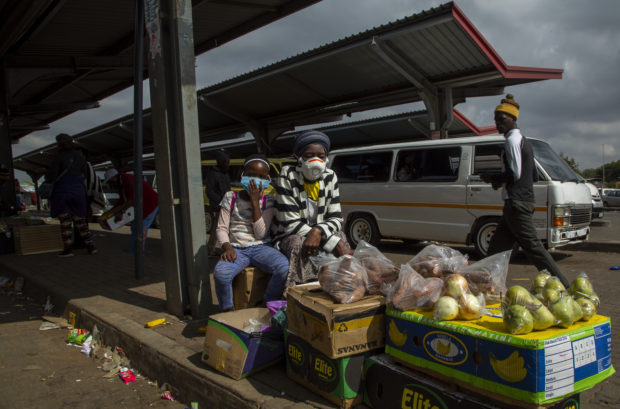Half billion more people face poverty due to virus – report

A woman and her daughter wearing face masks to protect against coronavirus, sell fruit and vegetables at the taxi station in Lenasia, south of Johannesburg, South Africa, Wednesday, April 8, 2020. South Africa and more than half of Africa’s 54 countries have imposed lockdowns, curfews, travel bans or other restrictions to try to contain the spread of the highly contagious COVID-19 coronavirus. (AP Photo/Themba Hadebe)
LONDON — Around half a billion people could be pushed into poverty as a result of the economic fallout from the coronavirus pandemic unless richer countries take “urgent action” to help developing nations, a leading aid organization warned Thursday.
In the run-up to three key international economic meetings next week, Oxfam has urged richer countries to step up their efforts to help the developing world. Failing to do so, it added, could set back the fight against poverty by a decade and by as much as 30 years in some areas, including Africa and the Middle East.
“The devastating economic fallout of the pandemic is being felt across the globe,” said Jose Maria Vera, Oxfam International Interim Executive Director. “But for poor people in poor countries who are already struggling to survive, there are almost no safety nets to stop them from falling into poverty.”
The report, which is based on research at King’s College London and the Australian National University, warns that between 6% and 8% of the global population could be forced into poverty as governments shut down entire sectors of their economies to manage the spread of the virus. As an example of the repercussions of the lockdowns in many Western countries, the report notes that more than a million Bangladeshi garment workers 80% of whom are women – have already been laid off or sent home without pay after orders were canceled or suspended.
Oxfam is calling on world leaders to agree on an economic rescue package to keep poor countries and poor communities afloat. Finance ministers from the Group of 20 leading economies are set to meet next week, as are the International Monetary Fund (IMF) and the World Bank.
Article continues after this advertisementAmong the measures Oxfam is recommending is the immediate cancellation of $1 trillion worth of developing countries’ debt payments due in 2020. It said canceling Ghana’s external debt payments this year, for example, would enable the government there to give a cash grant of $20 a month to each of the country’s 16 million children, disabled, and elderly people for a period of six months.
Oxfam is also recommending a $500 million increase in overseas aid and the creation of $1 trillion of special drawing rights at IMF, a move that effectively increases the liquidity available for developing countries in the crucial months ahead. This, according to the report, would give the Ethiopian government access to an additional $630 million, which would be enough to increase health spending by 45%.
For more news about the novel coronavirus click here.
What you need to know about Coronavirus.
For more information on COVID-19, call the DOH Hotline: (02) 86517800 local 1149/1150.
The Inquirer Foundation supports our healthcare frontliners and is still accepting cash donations to be deposited at Banco de Oro (BDO) current account #007960018860 or donate through PayMaya using this link.